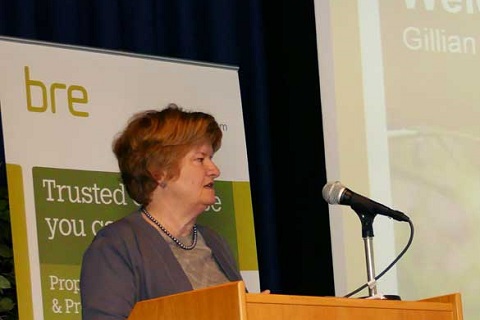As a newcomer to BRE, I’m really looking forward to getting to grips with what you – our customers and partners – want from us in this rapidly evolving field of health and wellbeing. Fundamentally I see a need to rebalance things so that we achieve complete synergy between the best interests of individuals and businesses, for the benefit of our wider society and economies. It seems to me that is a key expectation of our age.
As you’d expect, BRE is already committed to ensuring people who live and work in buildings have the best possible quality of life. After all we spend 90% of our lives in buildings, which means our health and wellbeing is influenced significantly by the built environment.
However not long ago, the idea of promoting occupier health and wellbeing would have been dismissed as irrelevant to the real estate industry, yet it is now arguably on a par with such long-established influences on the industry as sustainability and energy efficiency. In fact, it’s estimated to be an industry now worth some $4.2 trillion annually with double digit growth consistently over the last few years.
Importantly, the driver is not regulatory force but occupier demand. According to the 2018 Global Talent Trends survey, 1 in 2 employees would like to see a greater focus on wellbeing in their working environment from a perspective of both physical and psychological wellness. It’s an example of the growing approach of ‘treating property as a service’.
Workplace wellbeing is about more than helping employees to feel happy and healthy – it also benefits companies’ bottom lines, with engaged employees driving successful business performance; an effective physical work environment will lead to fewer days of sick leave and greater attention levels through improved indoor environmental conditions, such as better air quality, quieter acoustics and increased natural lighting.
The business case is clear. Research also shows unarguable links between employee engagement and company performance. For example, businesses in the top quartile of Gallup’s global employee engagement database are 21% more profitable and 17% more productive than those in the bottom quartile.
Providing environments that facilitate well-being can also help with recruitment and retention. A company that has a wellbeing policy in place can convey a socially responsible and innovative image to prospective employees, partners and customers.
Let’s not forget that by 2025, millennials will comprise 75% of the global workforce and they definitely want to work in an inspiring workplace environment. According to co-working provider Mindspace, 21% of millennials have rejected a job because of uninspiring or poorly designed offices! That number is bound to grow.
BRE is in a unique position to provide a significant range of research, testing and advisory services in relation to health and wellbeing in a number of ways. For example, BREEAM has adapted its assessment criteria to reflect several wellbeing metrics to the point where almost 30% of the scheme reflects what could be classed as Wellbeing indicators.
BRE’s robust and evidence-based approach to problem solving, proof of concept and assurance has been used to provide validation of products, systems and practices in this field. This has provided a level of certainty in the evolving wellbeing sector where misinformation and unfounded claims are prevalent.
We are also playing our part in tackling other societal challenges such as the rise in Dementia in our ageing population. Together with Loughborough University and a number of partners we have developed a dementia friendly home on BRE’s Innovation Park, aimed at enabling people with dementia to live well in their homes and at the same time, ease the impact of dementia on the NHS.
The dementia friendly home project provides a vision and clarity to those who require or specify dementia friendly buildings. We very much hope it will lead to further discussions and a significant improvement in home outcomes for those living with dementia.
Coming to the theme of this symposium, another research project we are currently engaged with is of course the Biophilic Office which is a long-term research and demonstration project from BRE and Oliver Heath Design, supported by a range of partners who are all keen to make their mark in this field and looking to validate and commercialise specific wellbeing performance aspects.
Biophilic design acknowledges that we are genetically connected to nature and that a human-centred approach can improve many of the spaces that we live and work, with numerous benefits to our health, wellbeing and efficiency.
The scientific evidence for the positive influence of biophilic design, on the health and wellbeing of building occupants is substantial and growing. In an office environment this is shown as quantified improvements in productivity, wellness and a reduction in days absent due to illness.

